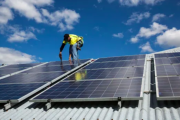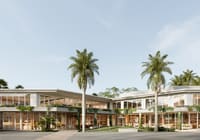
Are young professionals willing to change jobs over sustainability principles?
Young professionals are increasingly seeking out jobs with companies that align with their environmental principles.
Deloitte’s latest Gen Z and Millennial Survey of workers from across the globe found more than half were willing to forgo a position if the business did not match their values.
The majority of respondents stated they would research a company’s environmental impact and policies before accepting a job.
In Australia, a survey of more than 2000 people found the younger generations are more driven by environmental concerns, with 77 per cent of Gen Z and 69 per cent of Gen Y stating they would consider a brand’s social and environmental actions when choosing their next place of work.
The survey was commissioned by Republic of Everyone, a climate consultancy firm that works with major local and global brands.
Founder Ben Peacock said climate change, biodiversity destruction and inequality were the major crises facing the planet and the human race.
“If you look at those three challenges, while they have always been there, they are becoming more acute,” Peacock said. “This generation has inherited this at a point in time when the jury is out on whether they are even solvable.
“Based on that, I find it extremely obvious why the younger generation is more interested in this than the older generations.”
Big business has known for a long time that employee engagement is critical to their success and longevity, Peacock said. When people actually want to work for a particular company or cause, they are more productive and much more likely to stay in their job.
“The driver of sustainability over the last 15 years has been employees,” Peacock said. Investors and consumers are also pressuring companies to put more emphasis on environmental, social and corporate governance (ESG).
Peacock said passionate people can and do change jobs, sometimes “foregoing a very lucrative career in a space they don’t believe in to live a life they do believe in”.
Major developers in the commercial real estate sector are putting sustainability at the centre of building designs, prioritising energy efficiency, reducing waste, and promoting the health and happiness of those who frequent the building.
The results are breathtaking, futuristic workspaces filled with natural light. “People want to work in those buildings,” Peacock said. “Work is a large part of life, so shouldn’t it be healthy?”
For GPT, it was important to leverage a team of forward-thinking industry design specialists to create their portfolio of GPT DesignSuites, which are cutting-edge spaces that are fitted out and ready to go.
The workspaces are founded on environmental and social sustainability principles, which are integrated into the designs to foster collaboration and promote wellbeing.
GPT’s head of office, Martin Ritchie, said: “People are becoming more conscious of the environmental impacts of their actions and we are seeing this translate into their professional lives. They now have higher expectations of employers when it comes to environmental considerations, which includes the office they occupy.”
Located in Melbourne, Sydney, Parramatta and Brisbane CBDs, GPT DesignSuites support a circular economy, repurposing furniture, light fittings and fixtures throughout. Roughly one-fifth of furniture is sourced as pre-loved vintage items through recycled furniture providers such as Curated Spaces and Cultivated. GPT DesignSuites in Melbourne also have a 6-Star Green Star Interiors Design Rating and are located in buildings with Climate Active Carbon Neutral Certification.
As the importance of ESG continues to grow, developers are having more conversations with prospective tenants about sustainability credentials.
“It is becoming regular for tenants to request evidence of the Green Star Design Rating certificate or our Green Star Scorecard, and querying when we expect to receive Green Star As Built status, which we are currently working through,” Ritchie said.
GPT strives to measure, reduce and eliminate emissions wherever possible, he said. Offsets are then used for residual emissions, with the company partnering with Greenfleet, an Australian not-for-profit dedicated to establishing native biodiverse forests.
Ritchie said: “While we strive to eliminate all emissions where possible, we think it is important to compensate for those residual emissions that cannot be feasibly eliminated through high quality offsets, which remove carbon and have co-benefits in biodiversity rather than leaving a legacy of unabated emissions that add to climate change risk.”
Asked what separates GPT DesignSuites from ordinary workplaces, Ritchie pointed to the “high quality and longevity of the material selection, the commitment and investment in sustainable design and the exceptional aesthetic of the fitouts, along with the seamlessness and speed with which customers can lease them.”
This article has been created in partnership with GPT DesignSuites.










